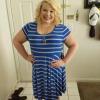Search the Community
Showing results for 'revision bypass'.
Found 17,501 results
-


Will be happy to be a slow loser
Mid West replied to Mid West's topic in PRE-Operation Weight Loss Surgery Q&A
After the fluids and mush weeks, my dietician isn't very strict or prescriptive as to what we should eat. We have guidelines of course which I'll stick to. But their thinking is that we should eat as normal a diet as possible so I won't have x amount of grams of this and y amount of that. Just an instruction to make sure I eat my protien first. The pre op diet is the same, he wants us to low fat eat food sticking to around 1000 cals, rather than liquids and again it's non prescriptive. I lost 9 stone (126lb) last year, quite quickly and put 6 stone (84lb) of it back on this year. I've always been able to lose weight but never keep it off, hence choosing the bypass over the sleeve. I'm happy to lose the weight after the surgery slowly this time, trying to eat as I will eat for my future rather than eating as if I'm on another diet - that way, the losing phase my be longer but I'll be learning how I'll be eating for the rest of my life and (hopefully, please God, touch wood), learning how to maintain :-) -
I have had my mind made up for months, on which surgery I want to have. But last week I met with the surgeon, and he suggested the sleeve. Ultimately it is my decision. He just said the sleeve is just as effective as the bypass, but without all the complications. I just want to have the surgery that will be the best tool, long term. I am 25 years old, and I don't ever want to be at this weight again. Height of 5'2 Weight 312 BMI 54-55 Please offer any advice you have! Surgery date is scheduled for February 25th! Thanks!
-
Dr. Rex Luttrell did my surgery & does my fills in Little Rock. Very nice man & easy on the eyes. He numbs you up before doing the fill. Don't know if he would fill you this early on though. I think he made me wait 4-6 weeks. I know he has done a port revision on a Mexico patient. I don't see him having a problem with it. Give him a call (501)552-4870. Good luck. They have also been advertising a Lap-Band clinic somewhere here in Arkansas. I have been seeing the commercials on TV the last couple of weeks. If I see it again I will post the name for you.............Jess
-
you have a bunch of phone calls ahead of you i thought most insurance companies require a 40+ BMI not 50+ do you have any co-morbities? can't figure why the surgeon isn't willing to do your WLS be persistent with the insurance company i would definitely talk to another surgeon if cigna is in your corner most insurances cover the lapband and gastric bypass WLS the sleeve has slowly emerged and being covered more often don't settle............it might take awhile but................ good luck
-


I don't know how to handle my life and changes..
Snunu posted a topic in Gastric Bypass Surgery Forums
Hi everyone! I feel bad and sad and know that is my fault of not following the diet and sport but I don't know how to manage it all.. I'm full time working mom of 2 boys, hubby is helping around but not much as he is really overloaded with work and one day off per week.. Boys are 10 (my stepson) and 4 (my birthson) and are very active and noisy and difficult to handle. My work is stressful. No friends or family around to help as we are expats living in the foreign country at the moment. All that is making it soo hard to focus on me and follow every rule I have to follow.. My day starts at 5 am and the only time I can be free falls after 9-9.30 pm and by that time I am sooo tired and just can't imagine myself doing any sports.. My food also isn't good enough as most of the time I don't have time cooking for myself, so I end up eating everything I cook for my family. It is not that bad food or unhealthy but still not suitable enough for me. I feel desperate today cuz I made my progress report and realized that despite I have lost 59.4 pounds in total, since bypass surgery, I have lost only 39.6 pounds. As a fact, I am 6 months post op and have such a poor results and such a poor self discipline and control over my life. I feel even at times that my pouch has stretched a lot cuz amount of food U can eat increased a lot too. I want to gain control. I cannot turn the clock back but I am ready to put myself at the first place now. Any advice on how could I start over? Cuz emotions and feelings that again the food controls my life are just killing me inside. I want to reach my target.. want to change.. just don't know again where to start... P.S. to make it easier to understand.. My surgery was done back home and the first 8 weeks were great with sport and food and then I had to go back here.. school, work.. and slowly everything went out of control.. and I found myself living the same life as before surgery. So for what then I was doing it all? Please guys, don't judge me much.. I just look for aupport I am so much lacking here.. -


The Naysayers.....do It Naturally! How To Handle Them.
Finding MeMe replied to SensationallySassyT's topic in PRE-Operation Weight Loss Surgery Q&A
Hi there, welcome to the forum. I made the decision after I gained almost 75lbs after I retired, As I turn 40 this wt started creeping up slowly and I just could't get it off no matter how many step aerobics and spin classes I took. I also ate small amounts but I could never get full and would end up consuming too many calories. I have been con constant diets my entire adult life froom 17 years old to 43 years old. I would say at least two crash diets per year because I was in the military and I had to starve myself twice per year to make weight. Upon retirement and my 45h birthday I was at 250lbs my highest wt ever, I took a look at a photo from my gym and I said it's time to do something drastic so I started researshing the gastric bypass. I ran into someone who was researching the sleeve and I did also, I liked what I read about the sleeve and got the surgery in Jan 2012. I am now down to 182lbs in 6 months and I could NEVER HAD DONE IT WITHOUT THE SLEEVE. I could not do this alone not even with all my military discipline, courage, blah, blah, blah. My best advice is to read and gather as much info as you can and prepare yourself mentally. It is an emotional experience, I have lost friends because of this surgery, they think I am better than they are after I lost the wt. My lifestyle is changed now and I can't be around all the food any more, they can't understand that. Thank God my husband supports me and he is the only friend I need. So get strength and knowledge because you will need it, Good luck to you and I wish you success and happiness. I know I found it with the sleeve and only wish I had the operation done earlier -
I would recommend the sleeve. Doctors are offering it more now because insurance companies have caught on to the high success rate it has, and are now covering the procedure. FYI I was told that if you are not happy with the sleeve you could have it revised to RNY, although this choice is very rare. BTW I am 11 days post op and love my sleeve so far. Good luck to you.
-
Hey everyone! I am new to this site...I have been a part of the RNY talk for about 4 months now and love it. Through this whole process I was positive I wanted the gastric bypass until I got to my appointment and my surgeon said she thought the sleeve was a better option for me bc I am so young there's no point in cutting my intestine. If anyone could give me any information or tell me ur success story would be awesome...I have to make a decision in the next few days and I feel like im going into this blind now because I don't know anything about the sleeve.
-


Pregnancy after sleeve?
ms.k_all_day replied to Godlybrickhouse1's topic in PRE-Operation Weight Loss Surgery Q&A
Yes!!!! I first got my sleeve in 2014.. I was 349 went down to 220 then I got pregnant with my 5th child... and then a year after I got pregnant with my sixth!!!! That's it for me!!! I learned my lesson and this coming Friday will be a new chapter for me... startingbover with my weight loss journey. I go for a revision and I'm getting the gastric bypass. I'm nervous. Please send positive energy my way[emoji26][emoji38][emoji38][emoji38] thanks in advance. Sent from my SM-J700T using BariatricPal mobile app -
Hey SJ - I was banded at U of Penn in Philly on 3/10/08. I don't know if my office will do fills if they didn't do the surgery, but you can check. Also, go to the websites of your local hospitals. If they have a bariatric department that would be your best bet. Even though you live hear, ask the question as if you just moved here. They will be less likely to question why you left the country to get the surgery. Plus, you are paying for your own fills so there shouldn't be any conflicts. It's worth a try. I know that in Philadelphia, only HUP and Temple Hospital have Bariatric Departments. Jefferson hosp does too, but they don't do Lap-Band - only the bypass. I checked them all out when I was deciding. Since I live in the city it was easy for me to pick Penn. Good Luck. Anne
-


Lisa Lampanelli On Inside Edition Rant!
UTGal99 replied to SensationallySassyT's topic in Rants & Raves
I think most people just don't know the difference between gastric bypass and gastric sleeve. I feel like most of the world thinks bariatric surgery is a big huge terrible horrifying thing you do to lose weight because you give up. People are just not informed and even the media screws up the message. Ugh! -


Not sure i'm losing enough
Lovelyladybee replied to cls5186's topic in POST-Operation Weight Loss Surgery Q&A
Surgery was 1/24 had gastric bypass so far I've lost 30 pounds, but like others have said every one is different I started at 301 pound now 271 -
Hi Jeri, So glad to hear about you. I'm also having a revision from lapband to sleeve. People like you keep me going. Thanks, Linda
-


Sharing our pre-band experiences and emotions
lisah25 replied to Koala's topic in LAP-BAND Surgery Forums
Very nicely written post. I can relate to so much of what you said. My husband was banded two years ago, he too chose it as self-pay rather then do the bypass our insurance would cover. I was terrified. I worried about him surviving the operation. I worried about him not losing weight and getting very depressed because he saw this as his last chance. I worried that he would lose weight and find someone prettier. Did I mention that I worried?! Well, he survived. He's healthier now then he's been in years. He's lost about 90 pounds, he's kind of taking his time with it. He looks good. I started to wonder if maybe there was something to this banding. So, I did more research. Ran some numbers, since I'm self-pay also. Made an appointment with his surgeon and said "OK, now I really have some questions". Got it all set up, got my date. Was told to lose 10-15 pounds and promptly gained 7! So now, I'm kind of in limbo. I had to wait until the end of August because of work deadlines. Giving me lots of time to think about how much this is going to cost, how much more in debt we will be. About how it will feel to have a device in me that has a say in what and how much I eat. How I'll feel if I can't, for whatever reason I think there might be, lose weight with this. I have a tendency to think things to death and over-analyze. To question my decisions. But I do feel this is a good choice for me. I've struggled with my weight since high school. I'll lose some, then slip up and gain it all back. I'm quite frankly tired of it. Of working so hard with nothing to show. I do realize that there is work ahead of me, but I feel like I'll have my little buddy to help. Hum, I think I need to come up with a name for my band... I agree, this is a journey and will be interesting. I have my op-day outfit picked out (A muu-muu from a recent trip to Hawaii), my shopping list written and my time of from work all figured out. Yay for us! -
So I remember the first time I ever heard of any weight loss surgery. I was 19 and my mom went under the knife for the Gastric Bypass. I was so excited for her. She had been heavy all my life and recently found out she was diabetic. I remember my sister and I joking that there is no way she is getting skinnier then us and we went on short-winded diets. I met my now husband that same year and he even went to the hospital with me to visit her. She was in longer because she had complications. Ever since 2004 I always wanted to go the other route where I worked out and ate healthier for short periods of time. I never thought I would ever consider surgery ever! But, it was in 2010 my husband starting telling me I should look into the surgery. (Not negatively he knew I wanted to lose weight and is very supportive). but it wasn't until 2011 I finally took a good look at my health insurance at work. I was amazed when I found out that they included it in their coverage! Bless you Marriott. So I first went to my parents because not only did my mother have surgery and experience have physical complications but the 3rd party center that helped her get approved for the surgery set her up at a hospital with a doctor out of her network. So my father was very worried about me seeing the fine print so that I didn't end up with any mystery costs. After getting their blessing, I moved forward in my journey and in May 2011 started my 6 month supervised diet. I remember not thinking twice... I wanted gastric bypass. But then the doctor suggested the sleeve and his knowledge and these forums changed my mind completely. I had everything going well and then there was a bump in the road. Come to find out at the last minute literally that I could not get approved for the surgery because the hospital was not deemed a "Center of Excellence" which was a stipulation of Marriott when they chose the benefit. But God is good and i was able to get an appointment at new hospital and 2 weeks later was approved for surgery! My approval was January 3rd at 9:30am. I remember seeing the number come across my phone and held my breath lol... but leading up to that moment with the small stall that occurred...I couldnt believe how I had let myself start to think. See on the 2nd my doctor called me to tell me they denied me but really they had just read the letter wrong because it was sent out before the holiday break and the problem had fixed itself the nxt day. So I remember thinking on the way home that maybe I'm just meant to be overweight. I really thought this could be my destiny. But like a Weight Watchers leader once taught me ... delete delete delete.. negative thoughts. And here I am now about a month away from surgery ecstatic. I am all the feelings that everyone else has had on this forum but I am so excited to be the me I feel is trapped inside this heavier body! I'd be lying if I said I wasn't a lil scared. I'm not really scared of the procedure itself but just the aftercare. I want to eat right and take care of myself right and get the most "bang for my buck" like they say. I can only take it one day at a time... but feb 13th can't come soon enough
-
Hi. I'm scheduled for bypass on April 26th! I live in the south hills of Pittsburgh. Looking for a buddy to worth together and make great things happen for us. Anyone interested in making s new friend/buddy? Dawn
-


Pre-op Diet Starting on Christmas Eve
Christina.Rose replied to Teajayteejay's topic in PRE-Operation Weight Loss Surgery Q&A
Im allowed 2 shakes and a low carb dinner my first week of pre-op. If you are allowed to have regular food at all just stay away from breads/sweets/starches.....carbs. Im getting revision-sleeved Dec 16th, so my Xmas will REALLY SUCK...lol. but you may have some flexibility depending on the doctors orders. Sent from my SM-J700P using the BariatricPal App -
Not sure if anyone is going to read this, but I figure blogging about my journey will give me something to look back on. It will help me note my progress. Surgery date is still 32 days away. It's the Monday before Thanksgiving. I just weighed myself and am currently at 256 (and that's rounding down). I usually stay around 255. My story is similar to everyone elses so I won't waste time with the details. Let's just say, a lot of time and money spent with very few (if any) results. I'm 27, and I realize I'm not getting any younger. I have been reasonably health, but had a scare that pushed me to start researching weight loss surgery. I'm very glad that I did and I'm extremely excited. Although I'M healthy, my family has a history of diabetes and heart problems and I wanted to nip that in the bud ASAP. I know a common question among the board is who do you tell about this journey? For the most part, I've told everyone. Everyone I work with, my whole family, and a few close friends. Amazingly, every single person I've told has been extremely supportive. I even told one of my friends (who I thought would react negatively) and she surprised me by being supportive! I feel super blessed to have such great people in my life. However, I have this one close guy friend that for some reason, I can't make myself tell. I do have feelings for him, so maybe that's why? It's been stressing me out a bit, and I'm really hoping that after surgery, he doesn't ask how I lost the weight so quickly. I guess I'll just have to jump that hurdle when I get to it. Originally, this journey was only supposed to be a 3 month one. However, the doctors confused my insurance, and it ended up being 6 months. Which isn't horrible...I'm just glad I'm getting it done. All of my pre tests are finished (since I orginally thought 3 months, I got right on it) and everything came back wonderfully. I have my psychiatrist appointment on Monday (the 24th). For those of you that are curious, I only have to pay 80 bucks. He doesn't accept my insurance, but I found him to be cheaper than the ones that do! My sister went to him when she had her bypass surgery a few years ago, and she said it only took a few minutes! I'll make sure to blog about my experience afterwards. I have my last appointment with Dr. K on November 3rd and I still have to get my primary doctors approval. Still two more nutrition classes left! I expect to start my pre op diet on or around November 11th. Not too excited about that, but I am determined to make it through! Well, that's a lengthy first blog! The others will be shorter.
-
You have hit on exactly why I am going to do this, too. I realistically don't think I'll ever be skinny...I'll be happy to get to 200, and I think I'll feel and look great when I get there (I'm 5-9). And I'm not scared of the procedure...I've been through much worse in a trauma situation, so I know I can handle this. What I'm scared of is the total change for the rest of my life. It isn't something we can switch on and off. I have a half-cup measure sitting on my kitchen counter and I look at it and think can I really stick with that? But I would never consider bypass, so this is like my last great hope. And I NEED to make this work. The people here are so encouraging and helpful...I know I am going to be depending on them to keep me going. They definitely understand better than my family. Which makes sense since these people have been through it. I know you can make the changes necessary to be successful with your band. It isn't a day by day decision...sometimes it's a minute by minute decision. We just have to hold on a minute at a time and it will get better. The fact that you've come this far and are ready for surgery shows that you are determined to make your life better. And those simple things you are wanting so much will come as you work with your band. (I'm talking to myself here as well as to you...I'm being banded Jan. 24). Wishing you the best procedure and recovery possible. Keep us posted. Hugs~ Emily
-
Even though it is just around the house I've been walking and walking and feeling better. I think I slept much too long last night in just one position which didn't help much. I only stayed one night in the hospital and between those things on my legs pumping up and down and the blood pressure monitor and all the interns I got NO rest, so I made up for it last night. I'm happy to say I'm feeling better...have no gas, and not hungry. I have absolutely no regrets over having this surgery. It is something that because of this forum I was well prepared for. I have had 5-way-bypass surgery and the pain from that can't even compare to this. I was 6 mo. recovering from that excruciating pain. I know my age isn't helping much either, but I'm going to do everything I can to make this work. Thanks all for all the support. God Bless, Dody
-
Southwest Bariatric Surgeons - Lap Band & Gastric Bypass Weight Loss Surgery - Austin, TX located in austin
-
I have a band and would like a sleeve revision. Problem is I can't find a revision surgeon willing to see me since they didn't place my band initially. That doesn't make sense to me:( I have excellent health insurance though. Do any if you know a good Houston area revision surgeon?? Thanks!
-


ACK! I'm dying from hunger and it's only day 4!!
MuffinBirdie posted a topic in LAP-BAND Surgery Forums
Hi All, Well there is definately a difference between my first band surgery and my revision. There is no fill in the band at all and I am STARVING. I've been on Clear liquids up until I had some tomato Soup this evening (same consistency at Slim Fast) and that finally took away the terrible hunger pains I was having. I mean, it was actual PAIN. And it's only been four days since the surgery. I am surprised I am so hungry even though I don't have any fill. Anyone else here had a revision have the same experience? The doctor did mention to me I didn't have to be on the clear liquid phase for as long as normal because I would be hungrier, but this is bad! Hopefully when I add yogurt to my diet tomorrow that will help some. Any thoughts? Mae -


Question for people with lower BMI
Rev Me Up! replied to Sap Soon's topic in PRE-Operation Weight Loss Surgery Q&A
I had a BMI of 31. But, I also had a lap-band. Since I was a revision, there was not as much concern about my low BMI. My doctor told me that I was not the only person at 30 or so BMI to get the surgery. It is unlikely, however, that you will get insurance to pay for it. I was self pay and I am happy with the results so far. There are a few low BMI folks on the board-- Lara -
Hi everyone ! I am due to have my band out on 7th July and then a sleeve revision in oct/nov. I am so nervous and have an overwhelming fear of dying. I'm 27 year old and although I want this more than anything I'm terrified !! Was anyone else like this? X















